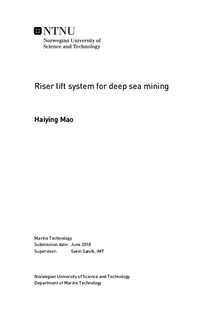Riser lift system for deep sea mining
Master thesis
Permanent lenke
http://hdl.handle.net/11250/2563979Utgivelsesdato
2018Metadata
Vis full innførselSamlinger
- Institutt for marin teknikk [3472]
Sammendrag
The growing global demand for rare metals and the declining land mineral resources impel the research on exploring seabed minerals resources. Based on this requirement, some research projects about deep sea mining are ongoing. Among them, this thesis focuses on one case, which is within the Norwegian interest zone along the North-East part of the Mid-Atlantic Ridge outside Svalbard, the water depth is in excess of 3000 m.
For deep sea mining in the North Atlantic at a water depth of over 3,000 meters, there are significant challenges with regard to operating the riser lift system needed to transport the minerals from the seabed to the sea surface. The objective of this master thesis is to explore the limitations of operating such a riser system at large water depths with focus on the dynamic behaviour of the system. In addition, based on the dynamic response and the limiting criteria, perform the fatigue analysis to find the fatigue life of the riser lift system. Then, comparing the difference of the dynamic behavior and fatigue life of the riser lift system under the two topside connection conditions.
The riser lift system may be in the form of a subsea pump and a vertical riser transporting slurry flow (water and rock). A case study was performed for representative sea states with regard to two working conditions by the Riflex module of SIMA. The top of the riser was connected to a vessel, and the end of the riser was connected to a pump. The length of the riser was 2970m, and the water depth was 3000m. Two working conditions were studied: The operating condition where the top of the riser was connected to the vessel by a pin joint. For the installation condition, the top of the riser was completely fixed to the vessel.The external load of the riser lift system is just considered the Morison load, which contains the current load, the wave load and the resulting vessel motion. The scatter diagram of the northern North Sea was applied as basis for this case.
The results of this study indicated that the topside connection of the riser has a big impact on the riser. The bending moment and stress of the riser with fixed topside connection is much larger than it with pinned topside connection. Moreover, all the dynamic response of riser is increasing as the growing of the wave significant height. The limiting sea states of the riser with pinned topside connection is when the wave significant height is larger than 7m. And to the fixed topside connection is when the wave significant height is larger than 2m. In addition, in this case, the fatigue life of the riser is too short whatever the topside connection is. In general, it is difficult to apply a steel riser under these conditions, even if the vortex induced vibration is not considered in this study.
